ENGL 200 Report: Analyzing the Impact of Brexit on Housing Market
VerifiedAdded on 2023/01/09
|8
|2383
|84
Report
AI Summary
This report examines the multifaceted impact of Brexit on the UK housing market. It explores the economic uncertainty resulting from the UK's withdrawal from the European Union, analyzing how this uncertainty affects buyer confidence and property values. The report delves into the influence of interest rates, particularly the potential consequences of rate hikes on homeowners and landlords. It also investigates the specific challenges faced by first-time buyers in this volatile market. Through analysis of various factors, including financial value, interest rate fluctuations, and the impact on different buyer segments, the report aims to provide a comprehensive understanding of the evolving landscape of the UK housing market in the wake of Brexit. The report concludes by summarizing the key findings and highlighting the heightened uncertainty that will likely influence the housing market for the foreseeable future. The report uses multiple sources to support the arguments and draws conclusions about the future of the UK housing market.
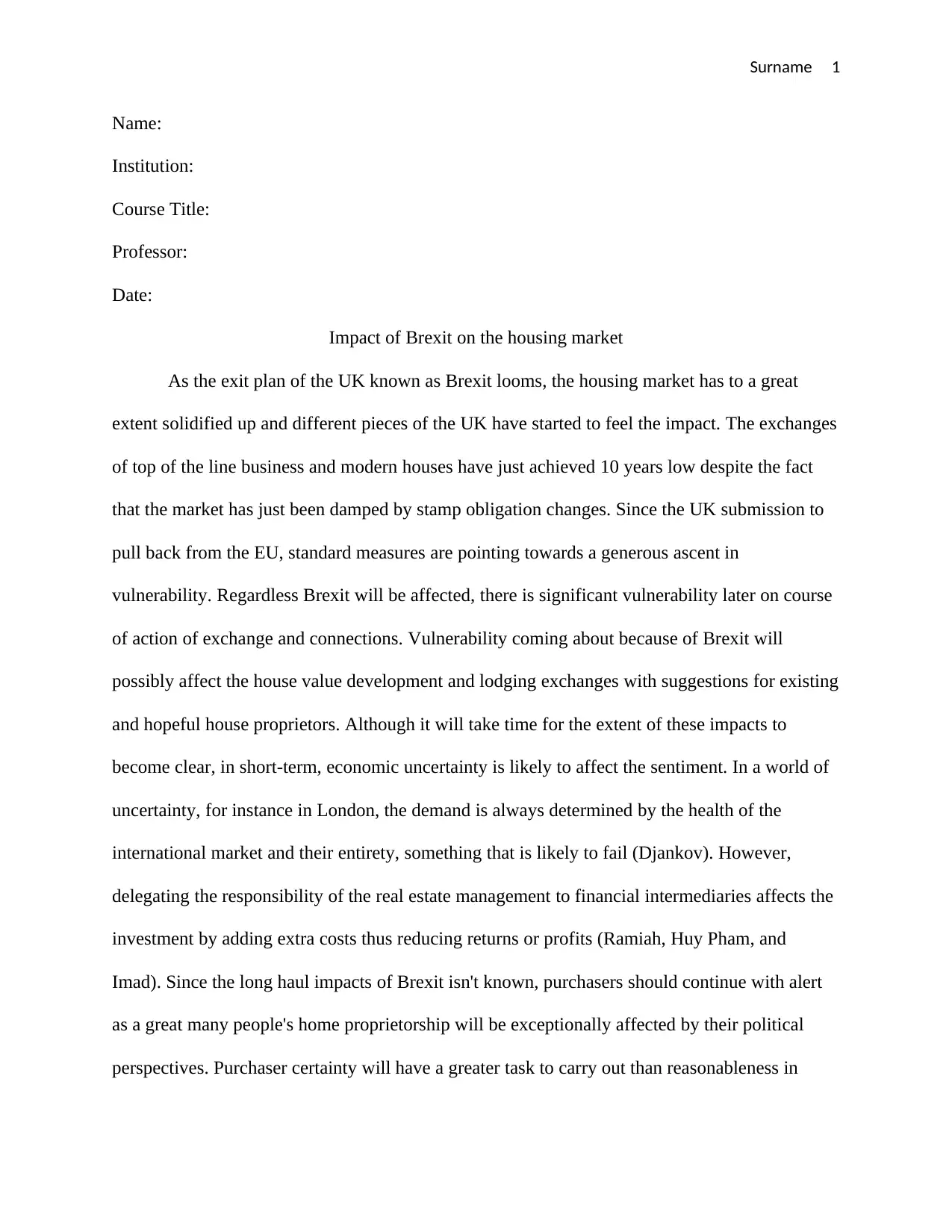
Surname 1
Name:
Institution:
Course Title:
Professor:
Date:
Impact of Brexit on the housing market
As the exit plan of the UK known as Brexit looms, the housing market has to a great
extent solidified up and different pieces of the UK have started to feel the impact. The exchanges
of top of the line business and modern houses have just achieved 10 years low despite the fact
that the market has just been damped by stamp obligation changes. Since the UK submission to
pull back from the EU, standard measures are pointing towards a generous ascent in
vulnerability. Regardless Brexit will be affected, there is significant vulnerability later on course
of action of exchange and connections. Vulnerability coming about because of Brexit will
possibly affect the house value development and lodging exchanges with suggestions for existing
and hopeful house proprietors. Although it will take time for the extent of these impacts to
become clear, in short-term, economic uncertainty is likely to affect the sentiment. In a world of
uncertainty, for instance in London, the demand is always determined by the health of the
international market and their entirety, something that is likely to fail (Djankov). However,
delegating the responsibility of the real estate management to financial intermediaries affects the
investment by adding extra costs thus reducing returns or profits (Ramiah, Huy Pham, and
Imad). Since the long haul impacts of Brexit isn't known, purchasers should continue with alert
as a great many people's home proprietorship will be exceptionally affected by their political
perspectives. Purchaser certainty will have a greater task to carry out than reasonableness in
Name:
Institution:
Course Title:
Professor:
Date:
Impact of Brexit on the housing market
As the exit plan of the UK known as Brexit looms, the housing market has to a great
extent solidified up and different pieces of the UK have started to feel the impact. The exchanges
of top of the line business and modern houses have just achieved 10 years low despite the fact
that the market has just been damped by stamp obligation changes. Since the UK submission to
pull back from the EU, standard measures are pointing towards a generous ascent in
vulnerability. Regardless Brexit will be affected, there is significant vulnerability later on course
of action of exchange and connections. Vulnerability coming about because of Brexit will
possibly affect the house value development and lodging exchanges with suggestions for existing
and hopeful house proprietors. Although it will take time for the extent of these impacts to
become clear, in short-term, economic uncertainty is likely to affect the sentiment. In a world of
uncertainty, for instance in London, the demand is always determined by the health of the
international market and their entirety, something that is likely to fail (Djankov). However,
delegating the responsibility of the real estate management to financial intermediaries affects the
investment by adding extra costs thus reducing returns or profits (Ramiah, Huy Pham, and
Imad). Since the long haul impacts of Brexit isn't known, purchasers should continue with alert
as a great many people's home proprietorship will be exceptionally affected by their political
perspectives. Purchaser certainty will have a greater task to carry out than reasonableness in
Paraphrase This Document
Need a fresh take? Get an instant paraphrase of this document with our AI Paraphraser
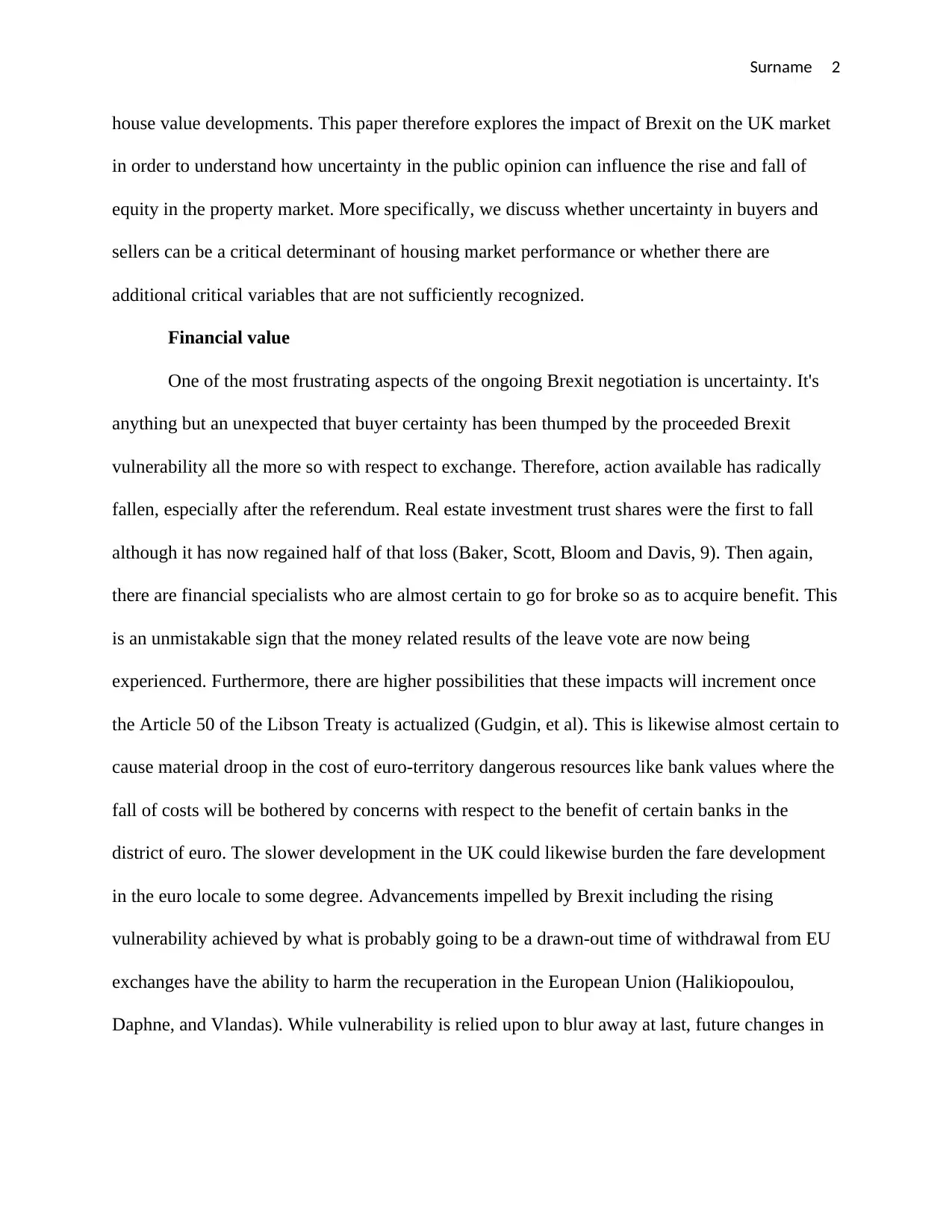
Surname 2
house value developments. This paper therefore explores the impact of Brexit on the UK market
in order to understand how uncertainty in the public opinion can influence the rise and fall of
equity in the property market. More specifically, we discuss whether uncertainty in buyers and
sellers can be a critical determinant of housing market performance or whether there are
additional critical variables that are not sufficiently recognized.
Financial value
One of the most frustrating aspects of the ongoing Brexit negotiation is uncertainty. It's
anything but an unexpected that buyer certainty has been thumped by the proceeded Brexit
vulnerability all the more so with respect to exchange. Therefore, action available has radically
fallen, especially after the referendum. Real estate investment trust shares were the first to fall
although it has now regained half of that loss (Baker, Scott, Bloom and Davis, 9). Then again,
there are financial specialists who are almost certain to go for broke so as to acquire benefit. This
is an unmistakable sign that the money related results of the leave vote are now being
experienced. Furthermore, there are higher possibilities that these impacts will increment once
the Article 50 of the Libson Treaty is actualized (Gudgin, et al). This is likewise almost certain to
cause material droop in the cost of euro-territory dangerous resources like bank values where the
fall of costs will be bothered by concerns with respect to the benefit of certain banks in the
district of euro. The slower development in the UK could likewise burden the fare development
in the euro locale to some degree. Advancements impelled by Brexit including the rising
vulnerability achieved by what is probably going to be a drawn-out time of withdrawal from EU
exchanges have the ability to harm the recuperation in the European Union (Halikiopoulou,
Daphne, and Vlandas). While vulnerability is relied upon to blur away at last, future changes in
house value developments. This paper therefore explores the impact of Brexit on the UK market
in order to understand how uncertainty in the public opinion can influence the rise and fall of
equity in the property market. More specifically, we discuss whether uncertainty in buyers and
sellers can be a critical determinant of housing market performance or whether there are
additional critical variables that are not sufficiently recognized.
Financial value
One of the most frustrating aspects of the ongoing Brexit negotiation is uncertainty. It's
anything but an unexpected that buyer certainty has been thumped by the proceeded Brexit
vulnerability all the more so with respect to exchange. Therefore, action available has radically
fallen, especially after the referendum. Real estate investment trust shares were the first to fall
although it has now regained half of that loss (Baker, Scott, Bloom and Davis, 9). Then again,
there are financial specialists who are almost certain to go for broke so as to acquire benefit. This
is an unmistakable sign that the money related results of the leave vote are now being
experienced. Furthermore, there are higher possibilities that these impacts will increment once
the Article 50 of the Libson Treaty is actualized (Gudgin, et al). This is likewise almost certain to
cause material droop in the cost of euro-territory dangerous resources like bank values where the
fall of costs will be bothered by concerns with respect to the benefit of certain banks in the
district of euro. The slower development in the UK could likewise burden the fare development
in the euro locale to some degree. Advancements impelled by Brexit including the rising
vulnerability achieved by what is probably going to be a drawn-out time of withdrawal from EU
exchanges have the ability to harm the recuperation in the European Union (Halikiopoulou,
Daphne, and Vlandas). While vulnerability is relied upon to blur away at last, future changes in
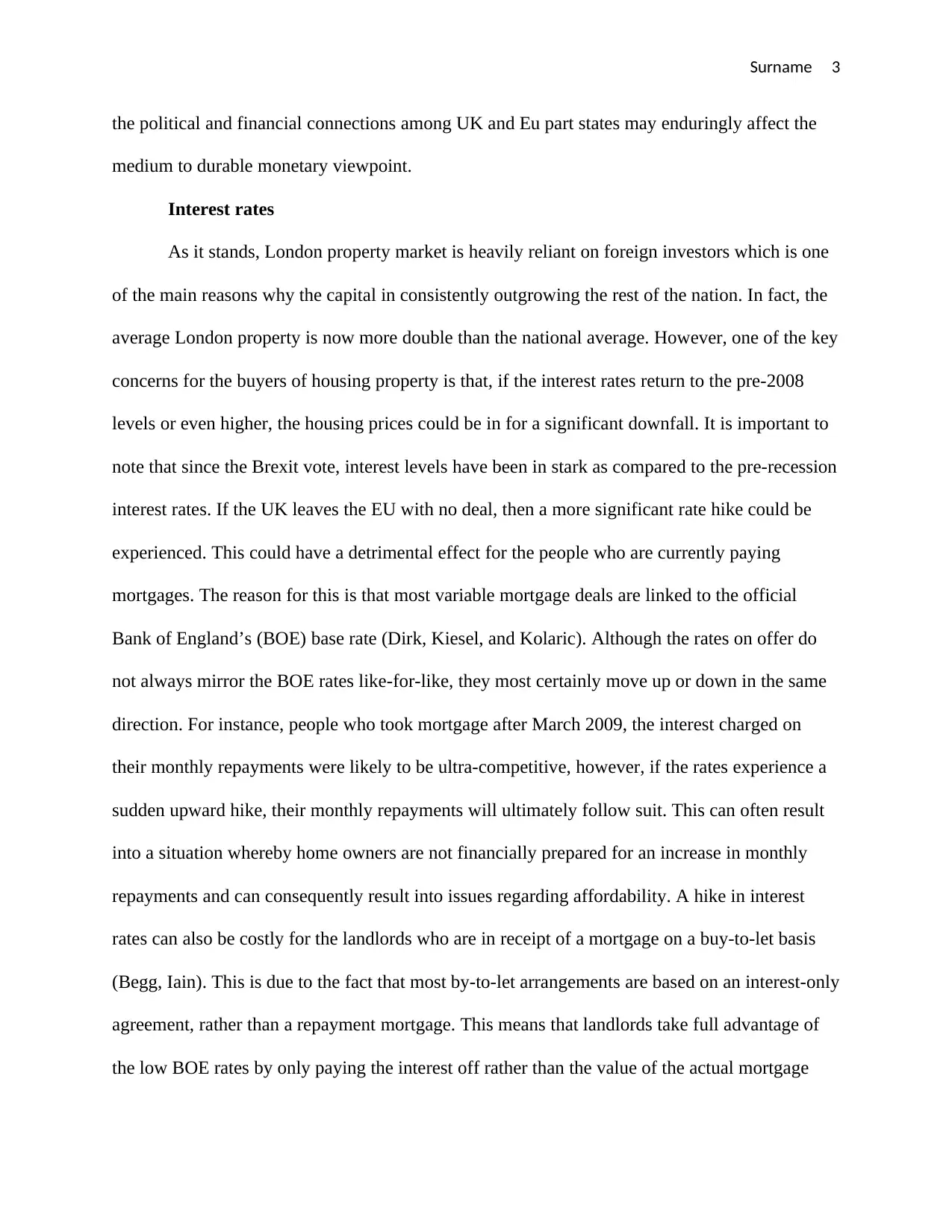
Surname 3
the political and financial connections among UK and Eu part states may enduringly affect the
medium to durable monetary viewpoint.
Interest rates
As it stands, London property market is heavily reliant on foreign investors which is one
of the main reasons why the capital in consistently outgrowing the rest of the nation. In fact, the
average London property is now more double than the national average. However, one of the key
concerns for the buyers of housing property is that, if the interest rates return to the pre-2008
levels or even higher, the housing prices could be in for a significant downfall. It is important to
note that since the Brexit vote, interest levels have been in stark as compared to the pre-recession
interest rates. If the UK leaves the EU with no deal, then a more significant rate hike could be
experienced. This could have a detrimental effect for the people who are currently paying
mortgages. The reason for this is that most variable mortgage deals are linked to the official
Bank of England’s (BOE) base rate (Dirk, Kiesel, and Kolaric). Although the rates on offer do
not always mirror the BOE rates like-for-like, they most certainly move up or down in the same
direction. For instance, people who took mortgage after March 2009, the interest charged on
their monthly repayments were likely to be ultra-competitive, however, if the rates experience a
sudden upward hike, their monthly repayments will ultimately follow suit. This can often result
into a situation whereby home owners are not financially prepared for an increase in monthly
repayments and can consequently result into issues regarding affordability. A hike in interest
rates can also be costly for the landlords who are in receipt of a mortgage on a buy-to-let basis
(Begg, Iain). This is due to the fact that most by-to-let arrangements are based on an interest-only
agreement, rather than a repayment mortgage. This means that landlords take full advantage of
the low BOE rates by only paying the interest off rather than the value of the actual mortgage
the political and financial connections among UK and Eu part states may enduringly affect the
medium to durable monetary viewpoint.
Interest rates
As it stands, London property market is heavily reliant on foreign investors which is one
of the main reasons why the capital in consistently outgrowing the rest of the nation. In fact, the
average London property is now more double than the national average. However, one of the key
concerns for the buyers of housing property is that, if the interest rates return to the pre-2008
levels or even higher, the housing prices could be in for a significant downfall. It is important to
note that since the Brexit vote, interest levels have been in stark as compared to the pre-recession
interest rates. If the UK leaves the EU with no deal, then a more significant rate hike could be
experienced. This could have a detrimental effect for the people who are currently paying
mortgages. The reason for this is that most variable mortgage deals are linked to the official
Bank of England’s (BOE) base rate (Dirk, Kiesel, and Kolaric). Although the rates on offer do
not always mirror the BOE rates like-for-like, they most certainly move up or down in the same
direction. For instance, people who took mortgage after March 2009, the interest charged on
their monthly repayments were likely to be ultra-competitive, however, if the rates experience a
sudden upward hike, their monthly repayments will ultimately follow suit. This can often result
into a situation whereby home owners are not financially prepared for an increase in monthly
repayments and can consequently result into issues regarding affordability. A hike in interest
rates can also be costly for the landlords who are in receipt of a mortgage on a buy-to-let basis
(Begg, Iain). This is due to the fact that most by-to-let arrangements are based on an interest-only
agreement, rather than a repayment mortgage. This means that landlords take full advantage of
the low BOE rates by only paying the interest off rather than the value of the actual mortgage
⊘ This is a preview!⊘
Do you want full access?
Subscribe today to unlock all pages.

Trusted by 1+ million students worldwide
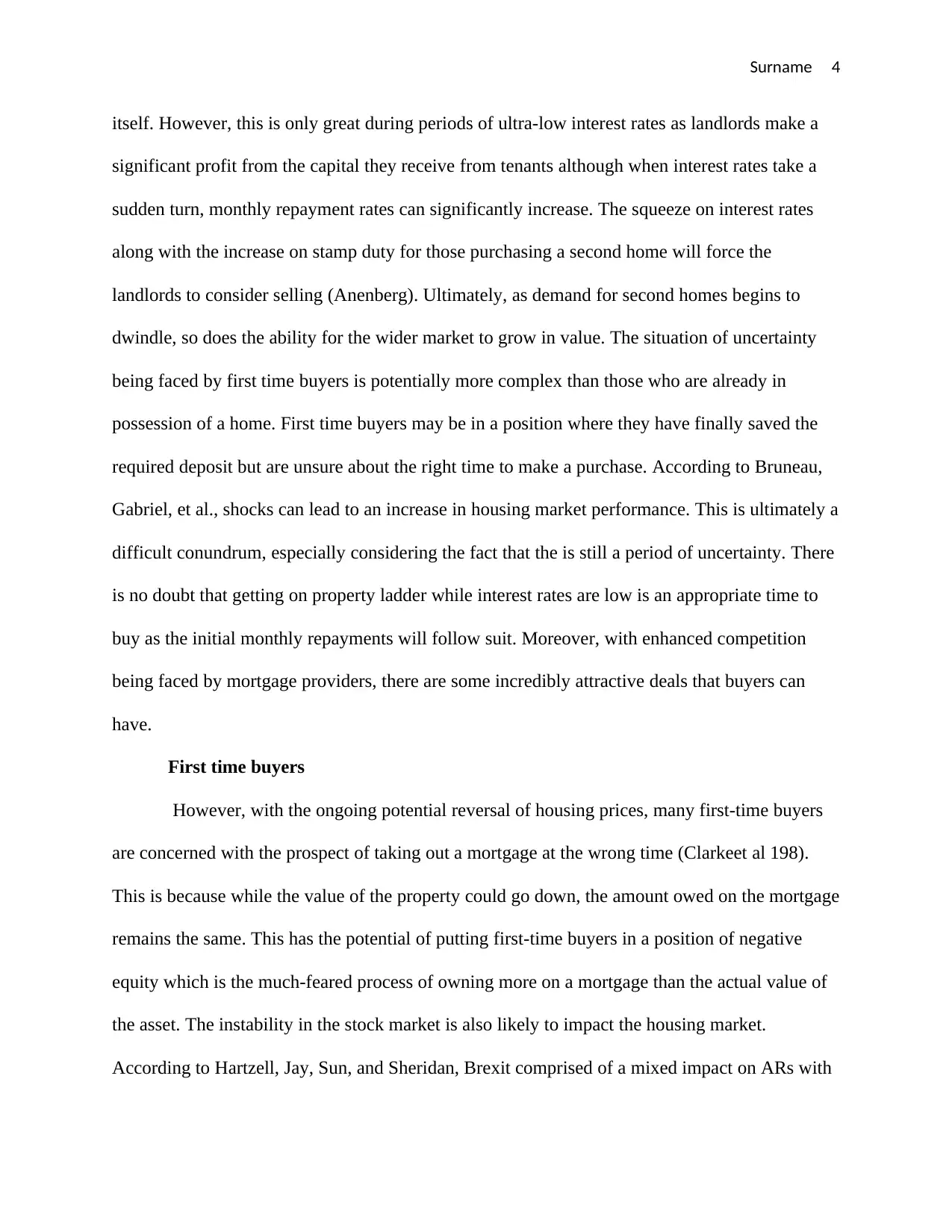
Surname 4
itself. However, this is only great during periods of ultra-low interest rates as landlords make a
significant profit from the capital they receive from tenants although when interest rates take a
sudden turn, monthly repayment rates can significantly increase. The squeeze on interest rates
along with the increase on stamp duty for those purchasing a second home will force the
landlords to consider selling (Anenberg). Ultimately, as demand for second homes begins to
dwindle, so does the ability for the wider market to grow in value. The situation of uncertainty
being faced by first time buyers is potentially more complex than those who are already in
possession of a home. First time buyers may be in a position where they have finally saved the
required deposit but are unsure about the right time to make a purchase. According to Bruneau,
Gabriel, et al., shocks can lead to an increase in housing market performance. This is ultimately a
difficult conundrum, especially considering the fact that the is still a period of uncertainty. There
is no doubt that getting on property ladder while interest rates are low is an appropriate time to
buy as the initial monthly repayments will follow suit. Moreover, with enhanced competition
being faced by mortgage providers, there are some incredibly attractive deals that buyers can
have.
First time buyers
However, with the ongoing potential reversal of housing prices, many first-time buyers
are concerned with the prospect of taking out a mortgage at the wrong time (Clarkeet al 198).
This is because while the value of the property could go down, the amount owed on the mortgage
remains the same. This has the potential of putting first-time buyers in a position of negative
equity which is the much-feared process of owning more on a mortgage than the actual value of
the asset. The instability in the stock market is also likely to impact the housing market.
According to Hartzell, Jay, Sun, and Sheridan, Brexit comprised of a mixed impact on ARs with
itself. However, this is only great during periods of ultra-low interest rates as landlords make a
significant profit from the capital they receive from tenants although when interest rates take a
sudden turn, monthly repayment rates can significantly increase. The squeeze on interest rates
along with the increase on stamp duty for those purchasing a second home will force the
landlords to consider selling (Anenberg). Ultimately, as demand for second homes begins to
dwindle, so does the ability for the wider market to grow in value. The situation of uncertainty
being faced by first time buyers is potentially more complex than those who are already in
possession of a home. First time buyers may be in a position where they have finally saved the
required deposit but are unsure about the right time to make a purchase. According to Bruneau,
Gabriel, et al., shocks can lead to an increase in housing market performance. This is ultimately a
difficult conundrum, especially considering the fact that the is still a period of uncertainty. There
is no doubt that getting on property ladder while interest rates are low is an appropriate time to
buy as the initial monthly repayments will follow suit. Moreover, with enhanced competition
being faced by mortgage providers, there are some incredibly attractive deals that buyers can
have.
First time buyers
However, with the ongoing potential reversal of housing prices, many first-time buyers
are concerned with the prospect of taking out a mortgage at the wrong time (Clarkeet al 198).
This is because while the value of the property could go down, the amount owed on the mortgage
remains the same. This has the potential of putting first-time buyers in a position of negative
equity which is the much-feared process of owning more on a mortgage than the actual value of
the asset. The instability in the stock market is also likely to impact the housing market.
According to Hartzell, Jay, Sun, and Sheridan, Brexit comprised of a mixed impact on ARs with
Paraphrase This Document
Need a fresh take? Get an instant paraphrase of this document with our AI Paraphraser
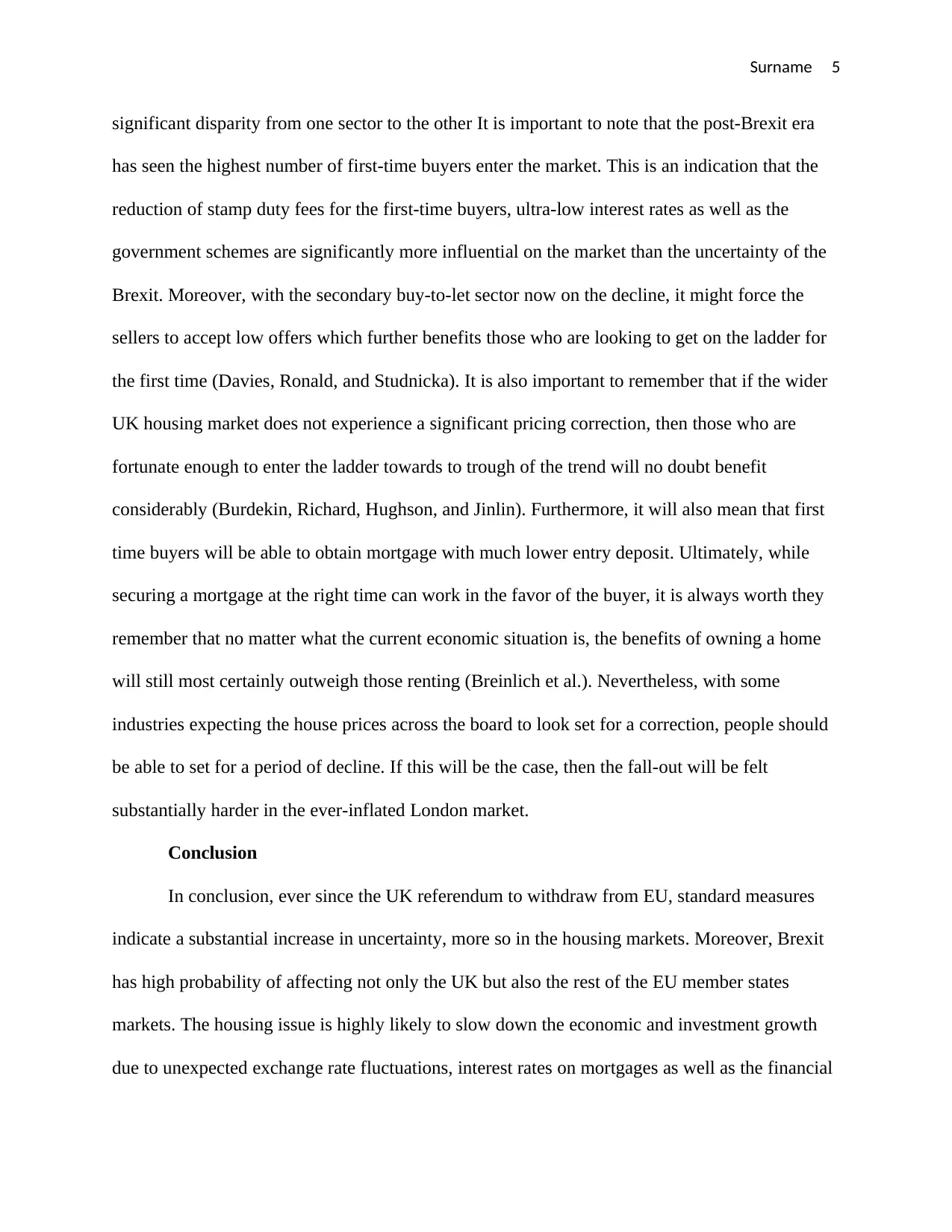
Surname 5
significant disparity from one sector to the other It is important to note that the post-Brexit era
has seen the highest number of first-time buyers enter the market. This is an indication that the
reduction of stamp duty fees for the first-time buyers, ultra-low interest rates as well as the
government schemes are significantly more influential on the market than the uncertainty of the
Brexit. Moreover, with the secondary buy-to-let sector now on the decline, it might force the
sellers to accept low offers which further benefits those who are looking to get on the ladder for
the first time (Davies, Ronald, and Studnicka). It is also important to remember that if the wider
UK housing market does not experience a significant pricing correction, then those who are
fortunate enough to enter the ladder towards to trough of the trend will no doubt benefit
considerably (Burdekin, Richard, Hughson, and Jinlin). Furthermore, it will also mean that first
time buyers will be able to obtain mortgage with much lower entry deposit. Ultimately, while
securing a mortgage at the right time can work in the favor of the buyer, it is always worth they
remember that no matter what the current economic situation is, the benefits of owning a home
will still most certainly outweigh those renting (Breinlich et al.). Nevertheless, with some
industries expecting the house prices across the board to look set for a correction, people should
be able to set for a period of decline. If this will be the case, then the fall-out will be felt
substantially harder in the ever-inflated London market.
Conclusion
In conclusion, ever since the UK referendum to withdraw from EU, standard measures
indicate a substantial increase in uncertainty, more so in the housing markets. Moreover, Brexit
has high probability of affecting not only the UK but also the rest of the EU member states
markets. The housing issue is highly likely to slow down the economic and investment growth
due to unexpected exchange rate fluctuations, interest rates on mortgages as well as the financial
significant disparity from one sector to the other It is important to note that the post-Brexit era
has seen the highest number of first-time buyers enter the market. This is an indication that the
reduction of stamp duty fees for the first-time buyers, ultra-low interest rates as well as the
government schemes are significantly more influential on the market than the uncertainty of the
Brexit. Moreover, with the secondary buy-to-let sector now on the decline, it might force the
sellers to accept low offers which further benefits those who are looking to get on the ladder for
the first time (Davies, Ronald, and Studnicka). It is also important to remember that if the wider
UK housing market does not experience a significant pricing correction, then those who are
fortunate enough to enter the ladder towards to trough of the trend will no doubt benefit
considerably (Burdekin, Richard, Hughson, and Jinlin). Furthermore, it will also mean that first
time buyers will be able to obtain mortgage with much lower entry deposit. Ultimately, while
securing a mortgage at the right time can work in the favor of the buyer, it is always worth they
remember that no matter what the current economic situation is, the benefits of owning a home
will still most certainly outweigh those renting (Breinlich et al.). Nevertheless, with some
industries expecting the house prices across the board to look set for a correction, people should
be able to set for a period of decline. If this will be the case, then the fall-out will be felt
substantially harder in the ever-inflated London market.
Conclusion
In conclusion, ever since the UK referendum to withdraw from EU, standard measures
indicate a substantial increase in uncertainty, more so in the housing markets. Moreover, Brexit
has high probability of affecting not only the UK but also the rest of the EU member states
markets. The housing issue is highly likely to slow down the economic and investment growth
due to unexpected exchange rate fluctuations, interest rates on mortgages as well as the financial
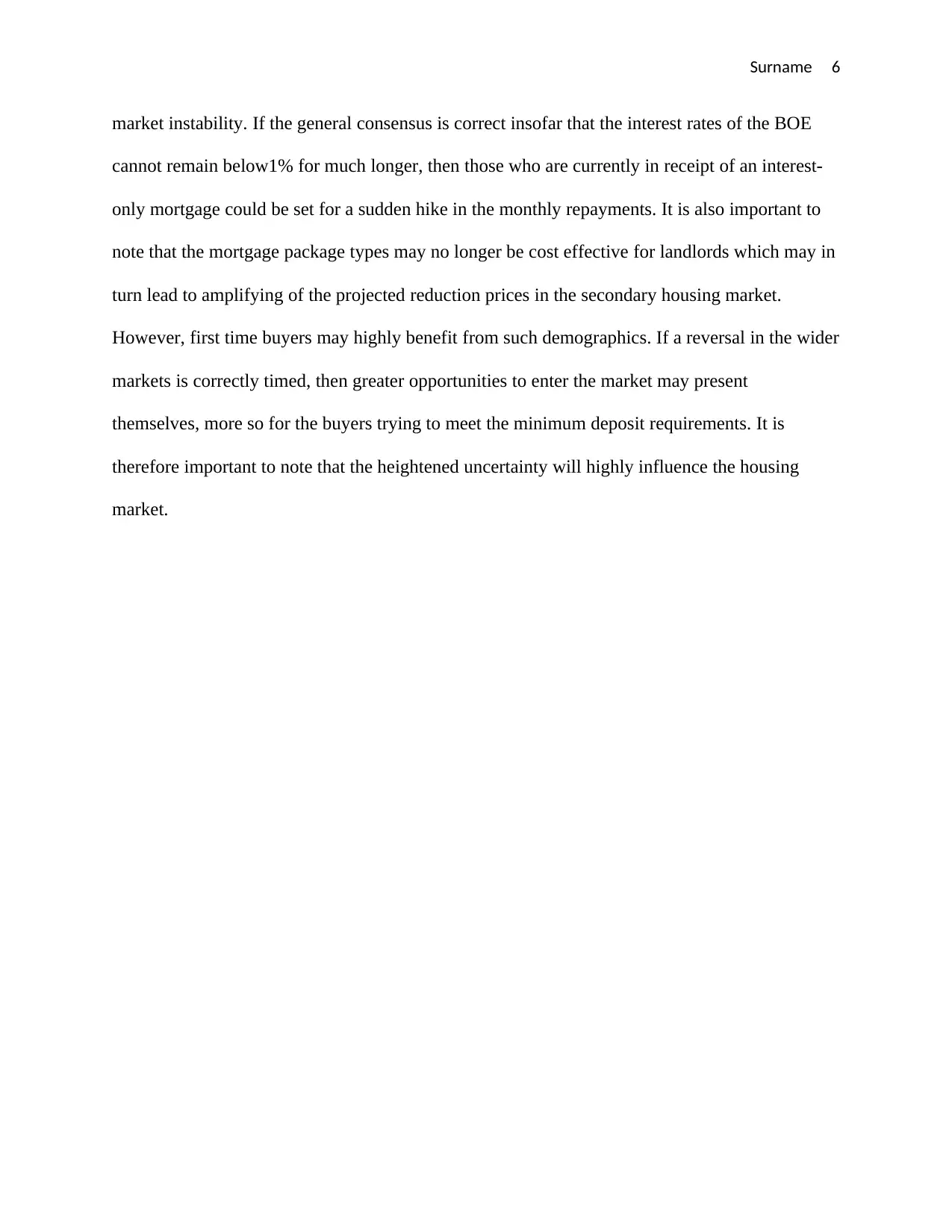
Surname 6
market instability. If the general consensus is correct insofar that the interest rates of the BOE
cannot remain below1% for much longer, then those who are currently in receipt of an interest-
only mortgage could be set for a sudden hike in the monthly repayments. It is also important to
note that the mortgage package types may no longer be cost effective for landlords which may in
turn lead to amplifying of the projected reduction prices in the secondary housing market.
However, first time buyers may highly benefit from such demographics. If a reversal in the wider
markets is correctly timed, then greater opportunities to enter the market may present
themselves, more so for the buyers trying to meet the minimum deposit requirements. It is
therefore important to note that the heightened uncertainty will highly influence the housing
market.
market instability. If the general consensus is correct insofar that the interest rates of the BOE
cannot remain below1% for much longer, then those who are currently in receipt of an interest-
only mortgage could be set for a sudden hike in the monthly repayments. It is also important to
note that the mortgage package types may no longer be cost effective for landlords which may in
turn lead to amplifying of the projected reduction prices in the secondary housing market.
However, first time buyers may highly benefit from such demographics. If a reversal in the wider
markets is correctly timed, then greater opportunities to enter the market may present
themselves, more so for the buyers trying to meet the minimum deposit requirements. It is
therefore important to note that the heightened uncertainty will highly influence the housing
market.
⊘ This is a preview!⊘
Do you want full access?
Subscribe today to unlock all pages.

Trusted by 1+ million students worldwide
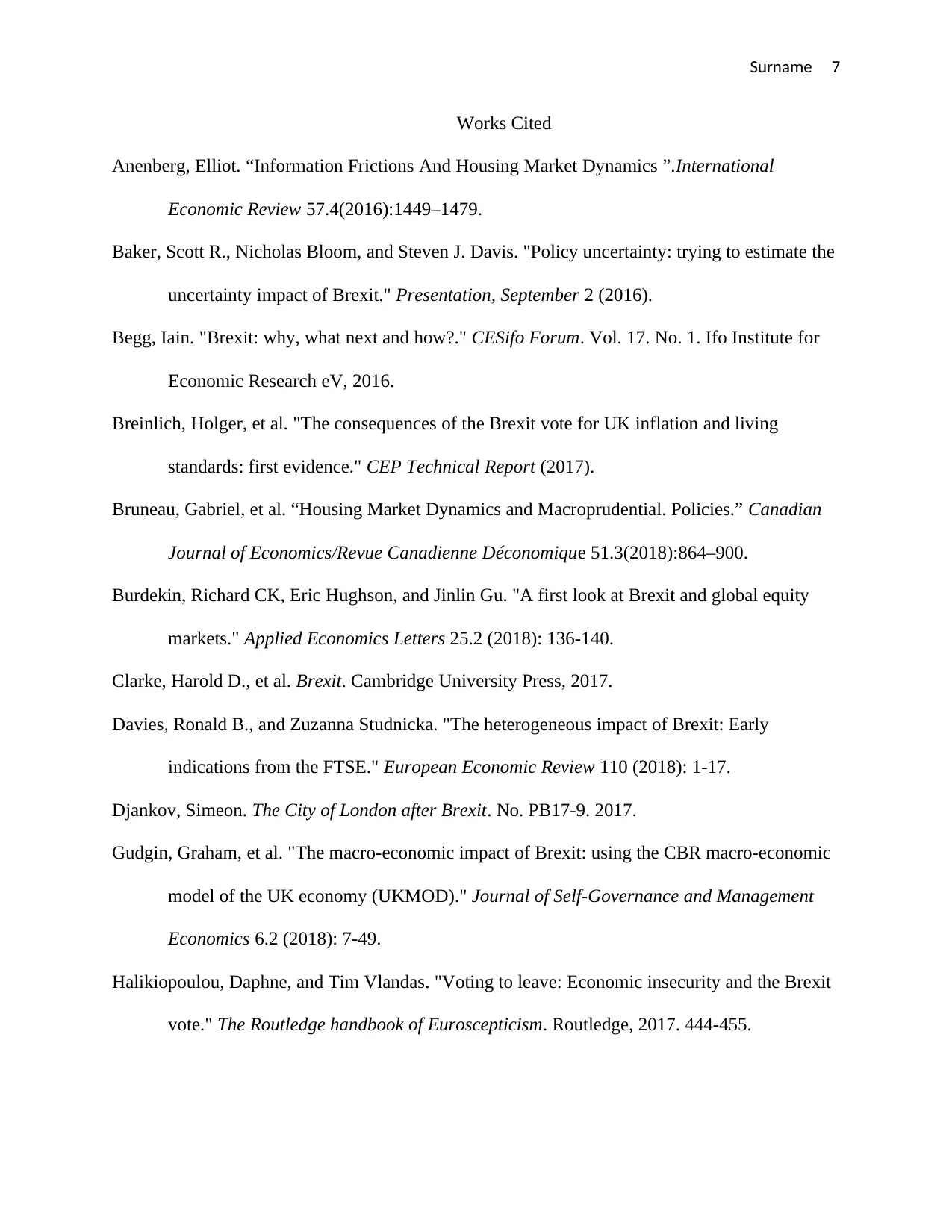
Surname 7
Works Cited
Anenberg, Elliot. “Information Frictions And Housing Market Dynamics ”.International
Economic Review 57.4(2016):1449–1479.
Baker, Scott R., Nicholas Bloom, and Steven J. Davis. "Policy uncertainty: trying to estimate the
uncertainty impact of Brexit." Presentation, September 2 (2016).
Begg, Iain. "Brexit: why, what next and how?." CESifo Forum. Vol. 17. No. 1. Ifo Institute for
Economic Research eV, 2016.
Breinlich, Holger, et al. "The consequences of the Brexit vote for UK inflation and living
standards: first evidence." CEP Technical Report (2017).
Bruneau, Gabriel, et al. “Housing Market Dynamics and Macroprudential. Policies.” Canadian
Journal of Economics/Revue Canadienne Déconomique 51.3(2018):864–900.
Burdekin, Richard CK, Eric Hughson, and Jinlin Gu. "A first look at Brexit and global equity
markets." Applied Economics Letters 25.2 (2018): 136-140.
Clarke, Harold D., et al. Brexit. Cambridge University Press, 2017.
Davies, Ronald B., and Zuzanna Studnicka. "The heterogeneous impact of Brexit: Early
indications from the FTSE." European Economic Review 110 (2018): 1-17.
Djankov, Simeon. The City of London after Brexit. No. PB17-9. 2017.
Gudgin, Graham, et al. "The macro-economic impact of Brexit: using the CBR macro-economic
model of the UK economy (UKMOD)." Journal of Self-Governance and Management
Economics 6.2 (2018): 7-49.
Halikiopoulou, Daphne, and Tim Vlandas. "Voting to leave: Economic insecurity and the Brexit
vote." The Routledge handbook of Euroscepticism. Routledge, 2017. 444-455.
Works Cited
Anenberg, Elliot. “Information Frictions And Housing Market Dynamics ”.International
Economic Review 57.4(2016):1449–1479.
Baker, Scott R., Nicholas Bloom, and Steven J. Davis. "Policy uncertainty: trying to estimate the
uncertainty impact of Brexit." Presentation, September 2 (2016).
Begg, Iain. "Brexit: why, what next and how?." CESifo Forum. Vol. 17. No. 1. Ifo Institute for
Economic Research eV, 2016.
Breinlich, Holger, et al. "The consequences of the Brexit vote for UK inflation and living
standards: first evidence." CEP Technical Report (2017).
Bruneau, Gabriel, et al. “Housing Market Dynamics and Macroprudential. Policies.” Canadian
Journal of Economics/Revue Canadienne Déconomique 51.3(2018):864–900.
Burdekin, Richard CK, Eric Hughson, and Jinlin Gu. "A first look at Brexit and global equity
markets." Applied Economics Letters 25.2 (2018): 136-140.
Clarke, Harold D., et al. Brexit. Cambridge University Press, 2017.
Davies, Ronald B., and Zuzanna Studnicka. "The heterogeneous impact of Brexit: Early
indications from the FTSE." European Economic Review 110 (2018): 1-17.
Djankov, Simeon. The City of London after Brexit. No. PB17-9. 2017.
Gudgin, Graham, et al. "The macro-economic impact of Brexit: using the CBR macro-economic
model of the UK economy (UKMOD)." Journal of Self-Governance and Management
Economics 6.2 (2018): 7-49.
Halikiopoulou, Daphne, and Tim Vlandas. "Voting to leave: Economic insecurity and the Brexit
vote." The Routledge handbook of Euroscepticism. Routledge, 2017. 444-455.
Paraphrase This Document
Need a fresh take? Get an instant paraphrase of this document with our AI Paraphraser
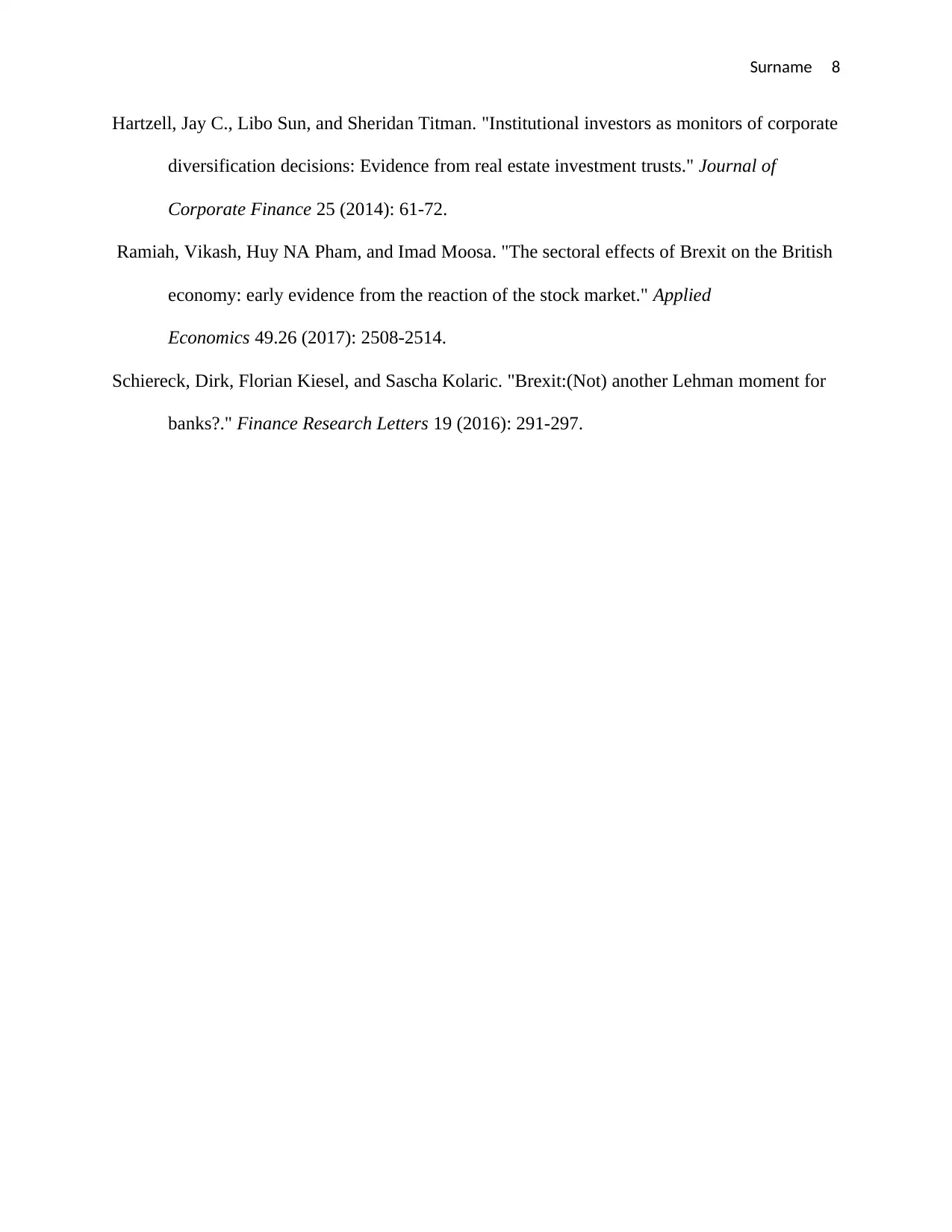
Surname 8
Hartzell, Jay C., Libo Sun, and Sheridan Titman. "Institutional investors as monitors of corporate
diversification decisions: Evidence from real estate investment trusts." Journal of
Corporate Finance 25 (2014): 61-72.
Ramiah, Vikash, Huy NA Pham, and Imad Moosa. "The sectoral effects of Brexit on the British
economy: early evidence from the reaction of the stock market." Applied
Economics 49.26 (2017): 2508-2514.
Schiereck, Dirk, Florian Kiesel, and Sascha Kolaric. "Brexit:(Not) another Lehman moment for
banks?." Finance Research Letters 19 (2016): 291-297.
Hartzell, Jay C., Libo Sun, and Sheridan Titman. "Institutional investors as monitors of corporate
diversification decisions: Evidence from real estate investment trusts." Journal of
Corporate Finance 25 (2014): 61-72.
Ramiah, Vikash, Huy NA Pham, and Imad Moosa. "The sectoral effects of Brexit on the British
economy: early evidence from the reaction of the stock market." Applied
Economics 49.26 (2017): 2508-2514.
Schiereck, Dirk, Florian Kiesel, and Sascha Kolaric. "Brexit:(Not) another Lehman moment for
banks?." Finance Research Letters 19 (2016): 291-297.
1 out of 8
Related Documents
Your All-in-One AI-Powered Toolkit for Academic Success.
+13062052269
info@desklib.com
Available 24*7 on WhatsApp / Email
![[object Object]](/_next/static/media/star-bottom.7253800d.svg)
Unlock your academic potential
Copyright © 2020–2026 A2Z Services. All Rights Reserved. Developed and managed by ZUCOL.





